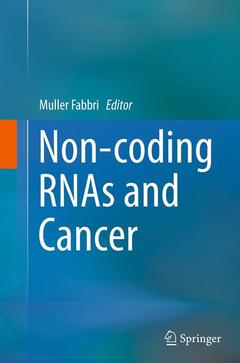Description
Non-coding RNAs and Cancer, Softcover reprint of the original 1st ed. 2014
Coordinator: Fabbri Muller
Language: English
Subjects for Non-coding RNAs and Cancer:
Keywords
Publication date: 08-2016
Support: Print on demand
Publication date: 10-2013
284 p. · 15.5x23.5 cm · Hardback
Description
/li>Contents
/li>Comment
/li>
The discovery of microRNAs and its role as gene expression regulators in human carcinogenesis represents one of the most important scientific achievements of the last decade. More recently, other non-coding RNAs have been discovered and its implications in cancer are emerging as well, suggesting a broader than anticipated involvement of the non-coding genome in cancer. Moreover, completely new and unexpected functions for microRNAs are being revealed, leading to the identification of new anticancer molecular targets. This book represents a comprehensive guide on non-coding RNAs and cancer, spanning from its role as cancer biomarkers, to providing the most useful bioinformatic tools, to presenting some of the most relevant discoveries, which indicates how these fascinating molecules act as fine orchestrators of cancer biology.
Examines recently identified gene regulatory mechanisms involving non-coding RNAs
Provides essential information of the biogenesis, physiology and de-regulation of non-coding RNAs in cancer
Guides the reader to the most widely and effectively used bioinformatic approaches to the study of miRNAs
Includes supplementary material: sn.pub/extras
These books may interest you

miRNA and Cancer 135.60 €



